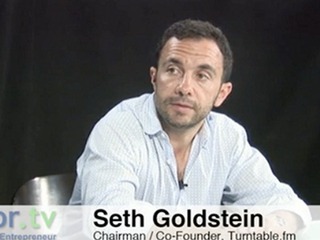Omair Ansari, CEO of Abhi, on the Vator Innovation Podcast
Abhi provides working capital to SMEs and earned wage access to employees
Read more...As most entrepreneurs and investors know, it takes a dozen iterations, pivots and sometimes re-starts before a company gets its stride. Often it's one small feature that takes off inside a company that becomes the main product. In some cases, it's an entirely new idea altogether.
That's the case with Turntable.fm, one of the hottest music start-ups to hit the scene. It shall forever go down in my book as one of the better examples of a major pivot that saved investors and the entrepreneurs.
In this segment of "Lessons Learned," Seth Goldstein, who co-founded Turntable.fm with Billy Chasen, gives us an inside look at his journey during that time, starting with the company's first $300,000 from Polaris Ventures and Mitch Kapoor in February 2010.
StickyBits' technology was about coding digital goods with media so you could scan a barcode and receive information. For example, if you had a suitcase and wanted to know what was inside, you could take a photo of the content. That photo would also be a sticker with a barcode that you could scan later to know the content of the box without having to open the box.
This idea turned out to be a dud. The key red flag that he spotted for StickyBits was the lack of "repeat usage" though there were 200,000 downloads of the application. The company, which raised an additional $1.6 million in May 2010, led by First Round, took another a year before deciding to drop the idea. By early spring 2011, and with $400,000 left in the bank, the company took the burn rate down from $100,000 to $120,000 a month to $20,000, and decided to figure out another game plan, including launching a totally new idea. By the end of May launched Turntable, a dramatically different idea from StickyBits.
Hear Goldstein talk about this journey; what StickyBits was about; and why his and Billy's non-music backgrounds made them perfect candidates for starting a social music company. "The streets in Silicon valley are littered with failed online music entrepreneurs," he said. "Because we didn’t come from that, we didn’t’ know any better.”
Goldstein also talks about the lessons he's learning about how to make companies more social and why being bottoms-up is better than top-down.
Around the time Goldstein launched Turntable.fm he was also in the process of selling his former company Social Media, which was eventually sold to LivingSocial. Social Media was an advertising company that relied heavily on Facebook.
Zynga is a great example of a company that went all-in on depending on Facebook. It was a smart move, though a costly one as 30% of revenue generated from Facebook still goes to the giant social network. Zynga's not alone. Many companies leverage Facebook's social graph, and rely heavily on the information ultimately owned by Facebook. Facebook, in fact relies on an entire ecosystem of new businesses to succeed.
But in some cases, building a business on Facebook can be, well, bad business. That's exactly the situation Goldstein and Social Media found themselves in. in this interview, hear Goldstein share lessons on why relying on Facebook, or any third-party platform, can ultimately be a bad idea.

Founder and CEO of Vator, a media and research firm for entrepreneurs and investors; Managing Director of Vator Health Fund; Co-Founder of Invent Health; Author and award-winning journalist.
All author postsAbhi provides working capital to SMEs and earned wage access to employees
Read more...Northstar democratizes wealth management for employees
Read more...Murad was appointed last week, succeeding founding CEO Stephanie Tilenius
Read more...
Joined Vator on
I'm the founder and CEO of turntable.fm Prior to turntable, I co-founded betaworks, where I created chartbeat, a real-time analytics service and firef.ly, a chat service.
Joined Vator on



